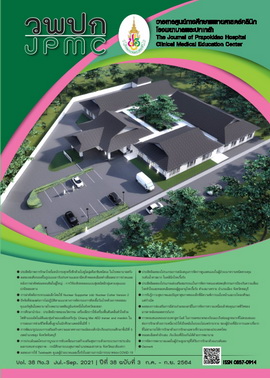The Effectiveness of a Self - Management Support Program for Brittle Diabetes Patients in an NCD Clinic
Main Article Content
Abstract
BACKGROUND: Diabetes is a major public health problem in Thailand. Although medical science has made major advancements, diabetes has still been unable to be completely cured. Moreover, many people with diabetes have no control over their blood sugar and must be admitted into hospitals for acute complications, in which the long term results in chronic microvascular complications. Therefore, a care and nursing model would focus on continuously maintaining the blood sugar levels to be close to their normal values. As such, diabetics could manage themselves, control the disease, and be able to prevent complications.
OBJECTIVES: To explain the effects of self - management support programs in poor controlled diabetes mellitus patients for knowledge, self - care behavior, HbA1C levels, and readmission rate.
METHODS: This study was a quasi - experimental research with a one group pretest – post - test design. The sample comprised 15 diabetes patients with Brittle Diabetes Mellitus diagnosed in the NCD Clinic, Phrapokklao Hospital, Chanthaburi Province, Thailand. The instruments used in this research consisted of three parts: Part 1 was the sample screening tool, Part 2 comprised an experimental tool that was a self - management support program for diabetes patients who had difficulty in controlling their glucose levels, and Part 3 was the tools for the data collection. The data was analyzed by frequency distribution, percentage, mean, standard deviation, and paired t - test in case of normal distribution and Wilcoxon signed - rank test in case of abnormal data distribution.
RESULTS: The results of the research found that knowledge, behavior, healthcare, and the service complacency after the end of the three - month self - management support program had a higher average than before receiving the program. This included the mean score of the HbA1C levels, and the number of the admission rates was significantly lower than before the program at a level of 0.05.
CONCLUSIONS: As a result of this study, the researcher created a self - management support program. This was to give patients confidence and skills in taking care of themselves, reduce problems, control the disease, and prevent complications, so that they could live a normal life.
Article Details
References
Diabetes Association of Thailand under The Patronage of Her Royal Highness Princess Maha Chakri Sirindhorn. Practice Guidelines for Diabetes A.D. 2017. 3rd ed. Bangkok: Rom Yen Media Company Limited; 2017.
Miller CA. Nursing for Wellness in Oldder Adults. 6thed. Philadelphia: Lippincott Williams & Wilkins; 2012.
Jainae S, Sasat S. Pedicting factors of hypoglycemia in hospitalized diabetic older persons, uppersouths region. Kuakarun Journal of Nursing 2016; 23(1): 148-62.
Kessin J, Wiruchagool P, Lonil A. Self- management, knowledge, quality of life in new case with type II diabetes mellitus, pre-post type II diabetes patients self- management program in Urban Area, Uthaithani Province. Journal of Nursing Division 2013; 40(1): 84-103.
Jung HS. Clinical implications of glucose variability: chronic complications of diabetes. Endocrinol Metab (Seoul) 2015;30:167-74.
Kanfer FH, Glodstein AP. Helping people change: a texbook of method. 4 th ed. New York: Pergamon Press. 1991
Kitcharoenchai R. The effectiveness of a nutritional self-management program on food consumption behaviors, HbAC, and body mass index in persons with type 2 diabetes. [dissertation]. Chonburi: Burapha University; 2013.
Jitapunkul S, Lailert C, Worakul P. Chula mental test: a screening test for elderly people in less developed countries. Int J Geriatr Psychiatry. 1996; 11: 715-20.
Ngamboontaem J. Effect of nutrition education and self-monitoring of sugar monitoring of blood glucose on hemoglobin a of type 2 diabetes patients. [Dissertation]. Bangkok: Thammasat University; 2014.
Siriburanon T. The outcomes of self-efficacy enhancement program in uncontrolled diabetic type 2 patients [Dissertation]. Bangkok: Christian University; 2012.
Amornteparak K, Prasongdee L. Effects of a health behavioral change program on a cardiovascular risk group of overweight public health officers in Thap Than District, Uthai Thani Province. J Prapokklao Hosp Clin Med Educat Center 2021; 38:152-60.
Peeraphruetthipong N, Pakdevong Nam - oy, Namvongprom A . Effects of self-management program on knowledge, self-care activity, and HbA1C in persons with type 2 diabetes mellitus. Journal of Nurses Association of Thailand North-Eastern Division 2012; 30(2): 98-105.
Saengsuwan S, Asawachaisuwikrom W, Homsin P. Effect of self-regulation with clinical information program on eating behavior and blood sugar level among uncontrolled diabetic patients. The Journal of Faculty of Nursing Burapha University 2011; 19(3): 54-64.

